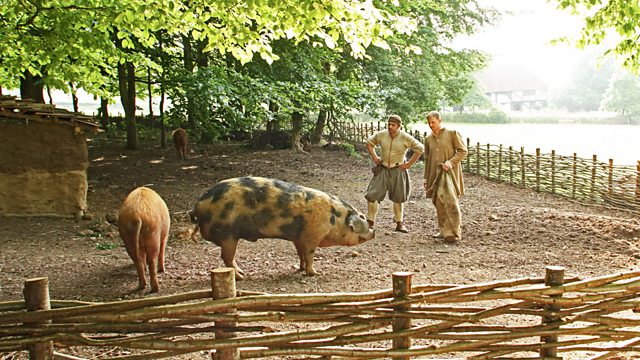
Episode 3
Historians run a farm in West Sussex exactly as it would have been in 1500. This episode focuses on the staple foods of everyday Tudor life - bread and ale.
In episode three the team focus on preparing the staple foods of everyday Tudor life - bread and ale. A hard-working Tudor farmer could consume a two pound loaf and drink eight pints of weak ale in a day. With the monasteries owning much of the farmland Ruth, Peter and Tom are well aware of the importance of praying for a successful harvest. They join their fellow parishioners in the tradition of 'beating the bounds' - circling the parish boundary while praying for a good yield.
The piglets are ten weeks old and Peter and Tom join pig farmer Neal Careswell in weaning them from their mother. Turkish the boar is now ready to be reintroduced to the sows.
Ruth, meanwhile, is in the woods trying to harvest wild yeasts from the air for the bread-making which will happen in the monastery bakehouse. Peter goes off to a local windmill to help with the production of wheatflour.
Life in a Benedictine monastery was based around a strict routine and time management was vital. Tom and Peter meet Abbot Aidan Bellenger to find out how this was done. Tom visits a foundry to help in casting a new bell, while Peter visits the British Horological Institute to see how a 13th-century mechanical clock works.
Peter helps bee expert Paul Hand harvest the beeswax used to make candles for the monastery. Paul shows him how to make the candles whose pure, clean flame represented the light of God.
Last on
More episodes
Previous
Next
Credits
| Role | Contributor |
|---|---|
| Presenter | Ruth Goodman |
| Presenter | Peter Ginn |
| Presenter | Tom Pinfold |
| Director | Stuart Elliott |
| Executive Producer | David Upshal |
Presenters
Meet the experts slogging it in the fields of the Tudor Monastery Farm.
Tom's blog: 'The animals were definitely the stars of the show'
'None of us liked the geese'
